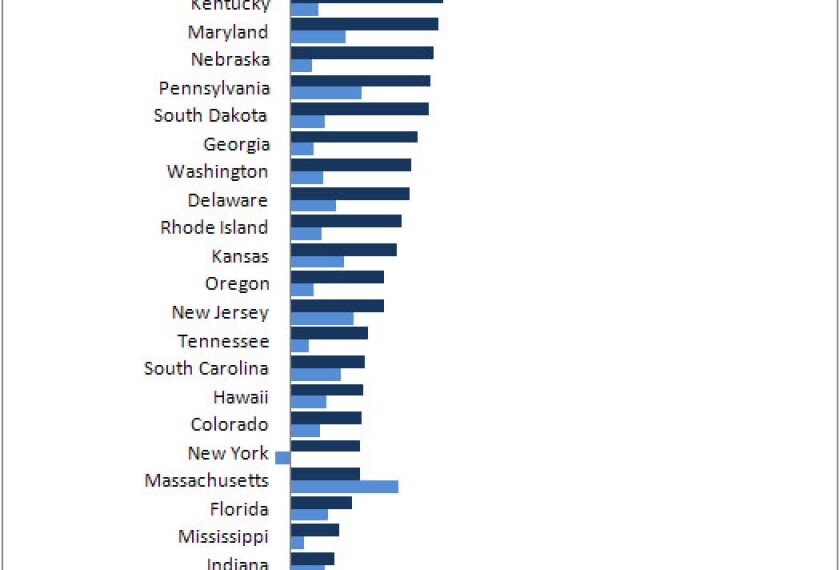Proficiency
We are no longer updating this page.
Education
Letter to the Editor
Nation Should Seek More Than 'Proficiency'
To the Editor:
The news that states have failed to raise standards on math and reading tests is certainly disappointing, but not at all surprising (“What Do Rising Title I Achievement Scores Really Mean?,” Inside School Research blog, Aug. 10, 2011). The federal education framework set in place by the No Child Left Behind Act requires our country’s states, districts, and schools to focus exclusively on maximizing the number of students considered “proficient” on end-of-year tests. This myopic attention to “proficiency” has led to two disturbing, but wholly unsurprising results: First, as your report noted, states have lowered standards to increase the number of students considered “proficient.”
The news that states have failed to raise standards on math and reading tests is certainly disappointing, but not at all surprising (“What Do Rising Title I Achievement Scores Really Mean?,” Inside School Research blog, Aug. 10, 2011). The federal education framework set in place by the No Child Left Behind Act requires our country’s states, districts, and schools to focus exclusively on maximizing the number of students considered “proficient” on end-of-year tests. This myopic attention to “proficiency” has led to two disturbing, but wholly unsurprising results: First, as your report noted, states have lowered standards to increase the number of students considered “proficient.”
Assessment
Most Students Lack Civics Proficiency on NAEP
High school seniors' scores fell, 4th graders' rose, and 8th graders' remained the same.
Teaching
Opinion
Academic Fluency: A Key to Academic Proficiency
David Ginsburg addresses a key to proficiency in any academic subject: fluency in that subject's language.
States
Opinion
The Proficiency Delusion
Letting states set the cut scores for tests used with "common-core standards" would repeat a bad mistake and set back reform, writes Mark Schneider.
Standards & Accountability
Opinion
Wish #2: The End of Proficiency Only Accountability Systems
The No Child Left Behind Act may represent the largest threshold-based government accountability system in the country. Schools are evaluated not by how much progress students make, but by their success in pushing students over the proficiency bar. By now, you're probably familiar with the discontents of this system: states can game the system by setting that proficiency bar low; some schools have triaged their students, essentially reallocating resources to the kids most likely to become proficient in the very short-term; and policymakers can misleadingly make claims about declining racial achievement gaps based on proficiency rates, even as these gaps are unchanged or growing.
English Learners
Weigh Proficiency, Assess Content
Students who are still working to master the English language are being held to the same reading and math proficiency targets as native English-speakers.
Education
Multiple Yardsticks for Measuring Proficiency
Although data from state testing programs show increasing proportions of students reaching or surpassing the proficiency bar, some experts question the validity of such gains. Those results have raised eyebrows, in part, because trend lines are rising much more rapidly on state-developed tests than on the U.S. Department of Education’s National Assessment of Educational Progress (NAEP), also known as The Nation’s Report Card.
Federal
Opinion
The Unintended Consequences of Focusing on Proficiency
I'm totally in awe of the regular commenters here - for me, they are the best part of this site. I had to share this comment by Rachel, who had this to say about the post below:
Standards & Accountability
Opinion
When Measuring Achievement Gaps, Beware the Proficiency Trap
Though we can thank the No Child Left Behind Act for drawing our attention to the "achievement gap" - which is now loosely deployed to reference gaps between African-American and white/Asian, poor and advantaged, suburban and urban, or even male and female kids - it's also done us a great disservice by distorting the way that we measure, and think about, differences between groups.
Education
Probing "Proficiency"
The Center on Education Policy has released a new study on what's happened with student achievement since the inception of No Child Left Behind. It concludes that 1) state achievement has risen in math and reading; and that 2) the achievement gap between white and minority students appears to have closed, at least judging by students' performance on state tests, and to a lesser extent, by their performance on the National Assessment of Educational Progress.
Education
Universal Proficiency: Possible or Not?
Can the nation meet NCLB's goal of universal proficiency? Yes, says Deputy Secretary of Education Raymond J. Simon. No, say Michael Rebell and Jessica Wolff of the Campaign for Educational Equity.
Education
NCLB and the Meaning of Proficiency
In this comment on a previous post, a mom says that the goal of 100 percent proficiency is possible. Using the real-life example of her dyslexic son, she says that students can make dramatic progress. But can they all reach proficiency?
Assessment
Opinion
The Grand Illusion of Proficiency
Dear Deb,
As usual, you raise lots of interesting questions and you sharpen our clear differences. Yes, I do think we should have national testing. This idea that fifty states should each have their own standards and their own tests is nutty. We are not getting higher standards; we may even be getting lower ones.
As usual, you raise lots of interesting questions and you sharpen our clear differences. Yes, I do think we should have national testing. This idea that fifty states should each have their own standards and their own tests is nutty. We are not getting higher standards; we may even be getting lower ones.







